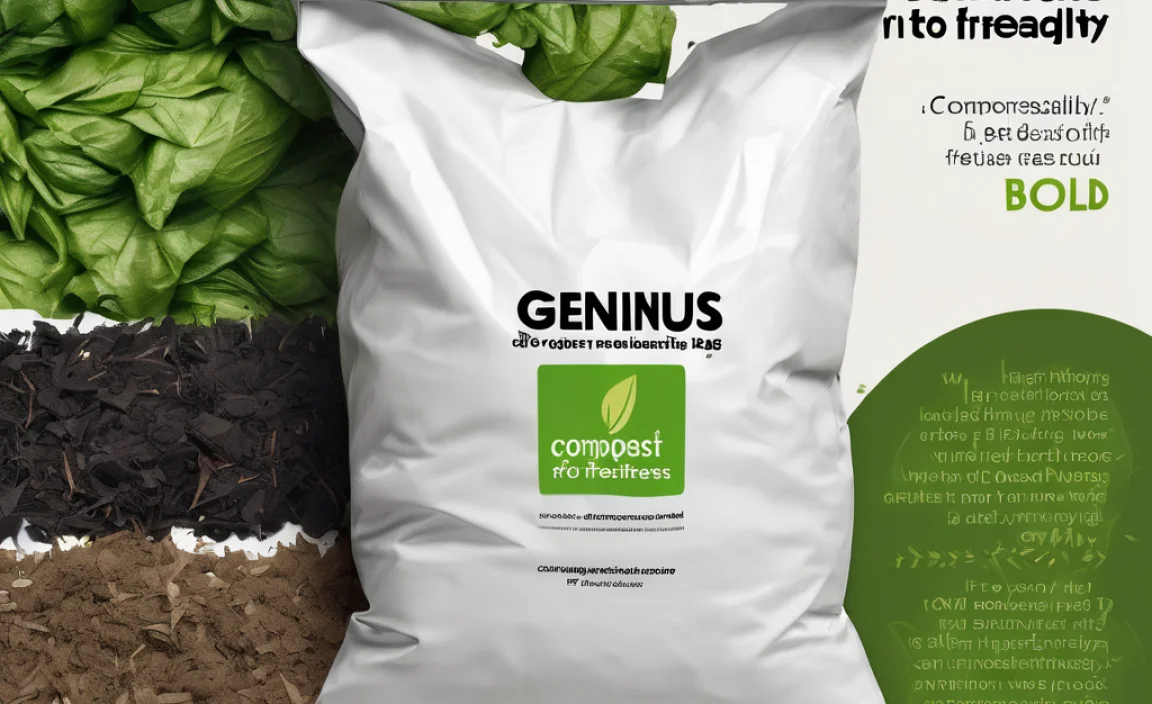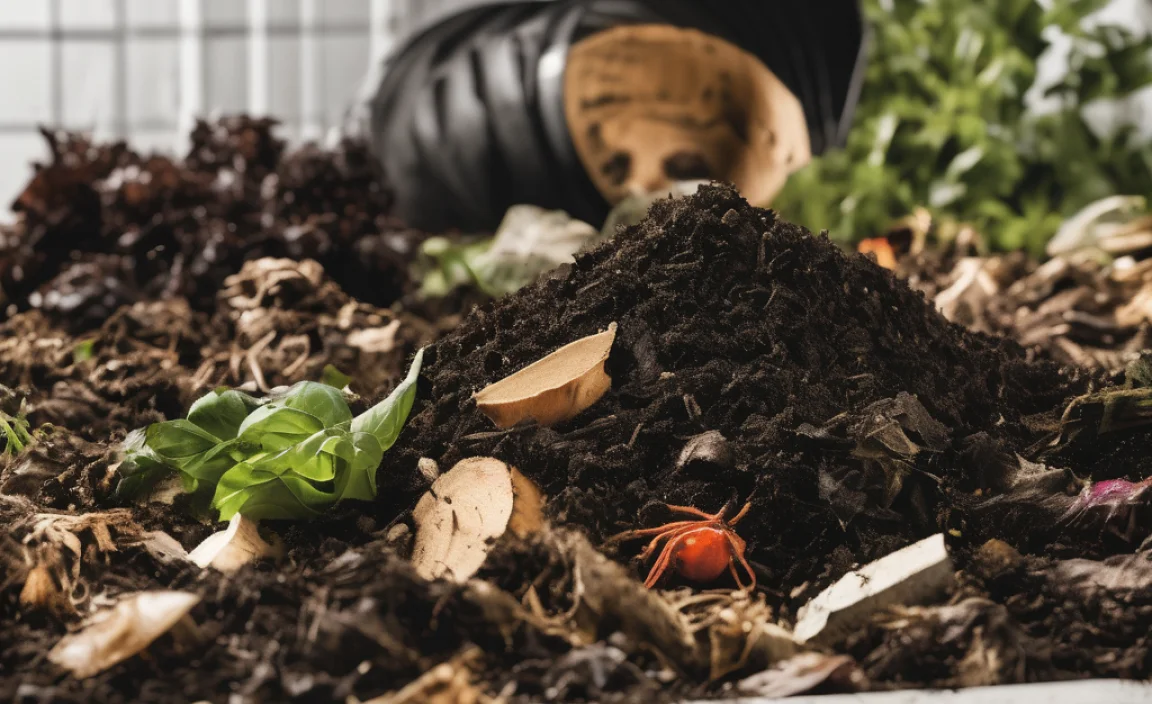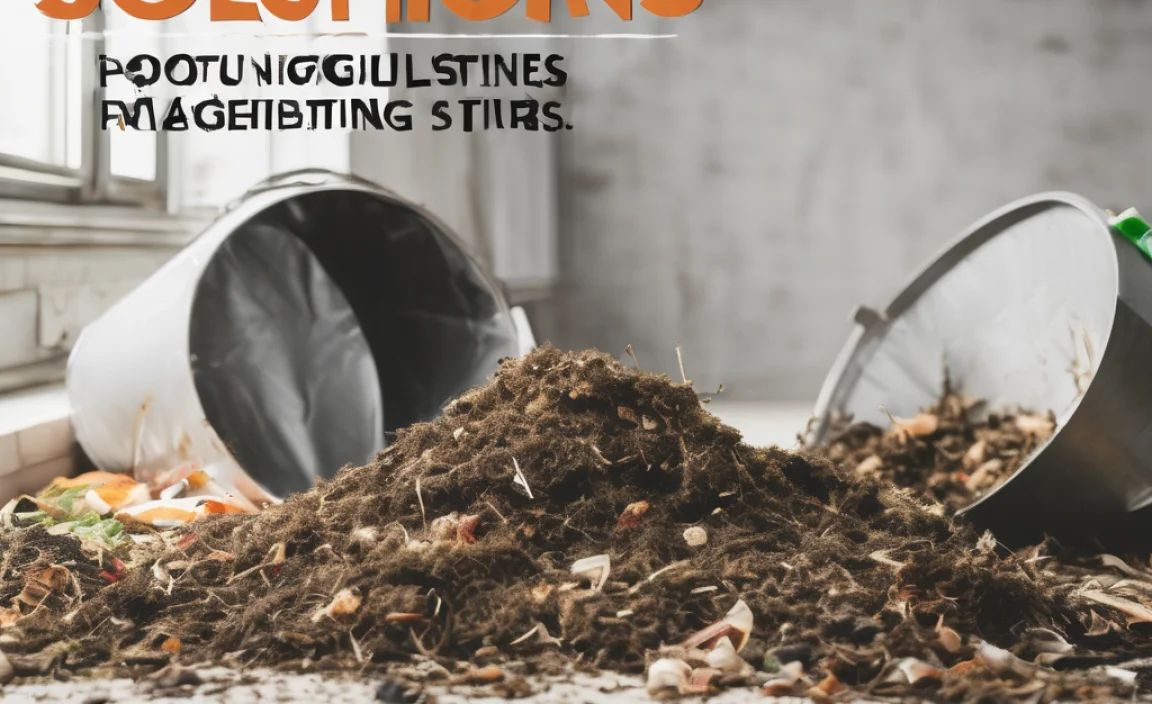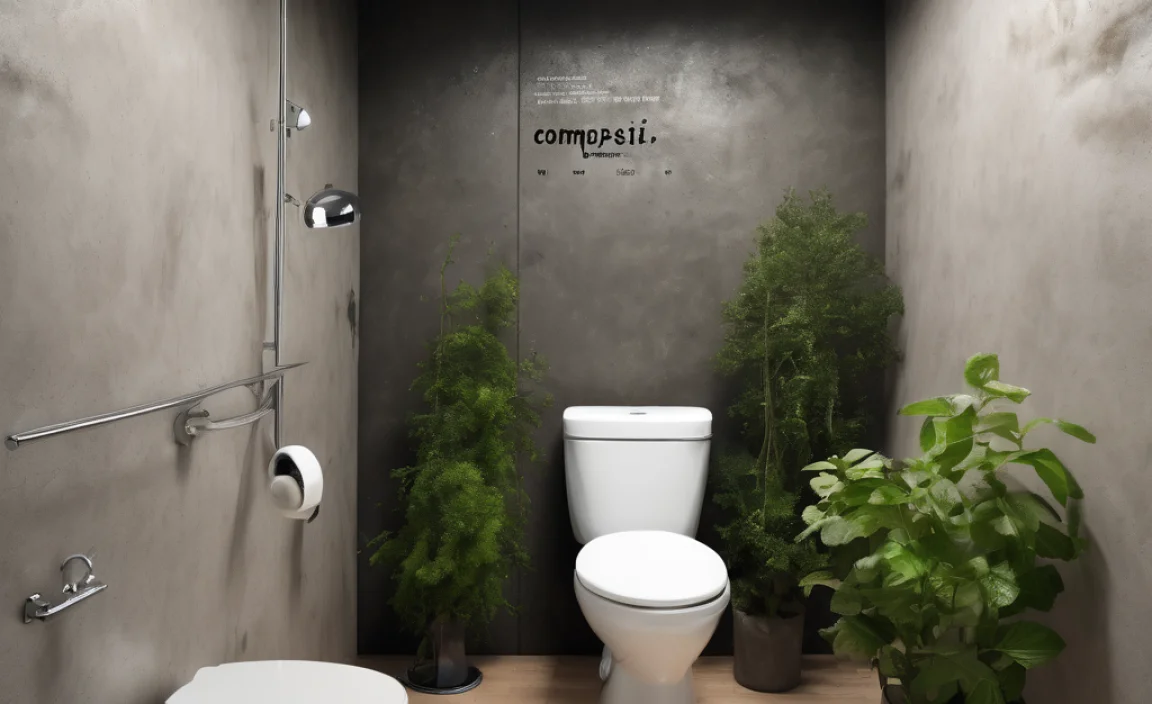Have you ever turned kitchen scraps into garden gold? Indoor composting isn’t just for farmers. Even if you live in a city, you can compost!
But what about that pesky indoor composting odor? Is it really as bad as some say? Read on to discover the truth and learn how to manage it.
Key Takeaways
- Indoor composting can be odor-free with the right steps.
- Choose the right bin to reduce unwanted smells.
- Know what materials to compost and avoid bad odors.
- Avoid adding dairy or meat to keep odors low.
- Indoor composting odor can be a sign of imbalance.
Understanding Indoor Composting Odor
Indoor composting is a great way to recycle kitchen waste. It can be done in small spaces too. But some worry about odors. These smells come from foods breaking down. If you do it right, the odor can be managed. Start by choosing the right compost bin. It should have a lid and be well-ventilated. Add materials in layers, like a lasagna. This helps control indoor composting odors.
- Use a bin with a tight lid.
- Add dry leaves or newspaper.
- Mix layers of food scraps and dry materials.
- Turn the compost often to add air.
- Avoid adding too much liquid.
- Keep the bin in a cool, dry place.
Remember, not all smells are bad. A slight earthy smell is normal. But foul odors mean something is wrong. Too much moisture can cause this. Balance wet food scraps with dry materials. Also, avoid putting meat or dairy in your compost. These can cause strong smells. With a little care, you can keep your indoor composting odor-free.
Fun Fact or Stats : In one year, a family can compost over 400 pounds of food waste!
Why Does Compost Smell Bad?
Have you ever noticed a funky smell from your compost? It’s like nature’s way of saying, “Something’s wrong!” The odor comes from the wrong mix of materials. Wet and smelly materials, like meat or dairy, can create bad smells. Your compost needs a balance of green and brown materials. Greens are like veggie scraps. Browns are like dry leaves or newspaper.
How Do You Fix a Smelly Compost Bin?
If your compost bin smells bad, don’t worry! You can fix it. First, check for too much moisture. Add dry materials like paper or leaves. This will soak up extra liquid. Next, mix your compost more often. This helps air get in. Air helps break things down without strong odors. Finally, check what you’ve been adding. Avoid adding meats or dairy. They don’t break down well in indoor bins.
Can You Compost Indoors Without Smelling?
Yes, you can compost without any bad smells! The trick is balance. Use the right mix of materials. Avoid things that smell bad in the first place. A good indoor compost bin helps too. Find one with a tight lid and good ventilation. Turn your compost often. This keeps everything breaking down properly. With these steps, you won’t have to worry about indoor composting odor.
Choosing the Right Compost Bin
Picking the right compost bin is important. It can help keep smells away. Look for bins with tight lids. They trap odors inside. But also make sure they have good airflow. Air helps compost break down properly. A bin with holes is ideal. It allows air in without letting smells out. You can find these bins in many stores or online.
- Choose a bin with a lid.
- Ensure the bin has ventilation holes.
- Pick a size that suits your kitchen space.
- Consider bins made from recycled materials.
- Check if it has a filter to reduce odors.
Once you have the right bin, use it correctly. Add layers of food scraps and dry materials. This keeps things balanced. Turn the compost often to add air. This helps break down food without unwanted smells. Remember, the right bin and care can make a big difference.
Fun Fact or Stats : Composting can reduce household waste by up to 30%!
What Makes a Good Compost Bin?
Ever wonder what makes a compost bin good? It’s all about the design. A good bin has a tight lid. This keeps odors inside. But it also has ventilation holes. These allow air in, so compost can break down properly. Plus, some bins have filters to help trap smells. Choose a bin with these features for a smell-free composting experience.
Should You Buy a Compost Bin or Make One?
You can buy a compost bin or make one at home. If you choose to buy, look for a bin with the features mentioned above. It should be durable and the right size for your space. If you want to make one, you can use a plastic container. Drill holes for ventilation. Add a tight-fitting lid. Making a bin can be fun and cost-effective.
Where Should You Place Your Compost Bin?
Placement is important for your compost bin. Choose a cool, dry place in your home. A kitchen corner or under the sink works well. Make sure it’s easy to reach. You want to add scraps without hassle. Avoid placing the bin in direct sunlight. This can make it too hot. A stable temperature helps things break down smoothly.
Materials to Compost Indoors
What can you compost indoors? You have many options. Most fruit and veggie scraps are perfect. Things like apple cores and carrot peels work well. Coffee grounds and tea bags are great too. Even eggshells can be composted. But remember, some items are not good for indoor composting. Avoid adding meat, dairy, or oily foods. They can cause bad odors.
- Add fruit and veggie scraps.
- Include coffee grounds and tea bags.
- Eggshells break down well in compost.
- Avoid meat and dairy to prevent odors.
- Use dry leaves or paper as brown materials.
Balancing these materials is key. Use about equal amounts of greens and browns. Greens are your food scraps. Browns are your dry materials. This balance helps prevent indoor composting odors. With practice, you’ll know what works best in your bin.
Fun Fact or Stats : Eggshells add calcium to compost, which is beneficial for plants!
Which Kitchen Scraps Can You Compost?
Did you know that many kitchen scraps can be composted? Fruit and veggie peels are excellent. Banana peels, apple cores, and carrot tops break down well. Coffee grounds and tea bags also work. They’re rich in nitrogen, which helps compost. But remember, not everything can be composted. Avoid putting in meat, cheese, or oily foods. They can cause unwanted smells and pests.
Why Avoid Meat and Dairy in Compost?
Why shouldn’t you compost meat and dairy? These items can spoil in your bin. They create strong odors and attract pests. Unlike fruits and vegetables, they break down slowly. This can upset the balance in your compost. It’s best to stick with plant materials. They break down quickly and don’t smell bad. Keeping meat and dairy out ensures a healthy, odor-free compost.
How Do Brown Materials Help Compost?
Browns are dry materials like leaves and paper. They add carbon to your compost. This is important for balance. Too much green can make it smell bad. Browns soak up extra moisture. They help everything break down evenly. When you layer greens and browns, you keep the smell down. Browns also provide structure to the compost. They help air flow better, which is what you want.
Managing Moisture in Indoor Composting
Moisture is key in indoor composting. Too much moisture can lead to bad smells. It can also make compost too wet. You need a good balance. Think of a damp sponge. That’s how moist compost should feel. If it’s too wet, add more dry materials. If it’s too dry, sprinkle a little water. Keeping moisture right helps prevent indoor composting odors.
- Check moisture levels often.
- Compost should feel like a damp sponge.
- Add dry materials to soak up extra moisture.
- Sprinkle water if the compost is too dry.
- Mix the compost to distribute moisture evenly.
Balancing moisture helps compost break down properly. When it’s too wet, bad bacteria can grow. This leads to strong smells. If it’s too dry, the compost doesn’t break down well. Keep checking and adjusting. This way, your indoor composting will be odor-free and efficient.
| Moisture Level | Action Needed |
|---|---|
| Too Wet | Add more brown materials |
| Too Dry | Add a small amount of water |
| Just Right | Maintain current balance |
| Smelly | Mix and add dry materials |
Fun Fact or Stats : Moisture content in compost should be around 40-60% for best results!
How Does Moisture Affect Composting?
Ever wonder why moisture matters in composting? It’s all about balance. Too much water means less air. This leads to bad smells. Too little water slows down the process. Compost should feel like a wrung-out sponge. This is just right. It keeps everything breaking down smoothly. The right moisture level means no odors, just healthy compost.
What to Do If Compost is Too Wet?
If your compost is too wet, fix it quickly. First, add more dry materials. Use leaves, paper, or sawdust. These soak up extra water. Next, mix the compost well. This helps distribute moisture evenly. You can also add more air. Turn the compost often. This will help it dry out. Proper moisture keeps indoor composting odor-free.
Tips for Keeping Compost Moisture Balanced
Keeping moisture balanced in compost is easy with a few tips. First, regularly check the moisture level. It should feel damp like a sponge. Second, layer greens and browns well. This helps balance moisture naturally. Third, mix the compost often. This distributes moisture and air evenly. Fourth, adjust as needed. Add dry or wet materials to maintain balance. Lastly, cover the compost to protect it from excess moisture or dryness.
Turning Compost for Better Airflow
Turning your compost is important. It helps with airflow. Air is vital for breaking down materials. Without it, compost can smell bad. Turning it mixes everything up. It spreads air and moisture evenly. This helps prevent indoor composting odors. Use a garden fork or shovel. Turn it every week or so. It makes a big difference.
- Turn compost weekly for good airflow.
- Use a fork or shovel for easy turning.
- Mix top and bottom layers well.
- Ensure air gets to all parts of the compost.
- Turning helps maintain moisture balance.
Regular turning helps compost break down faster. It keeps things fresh and odor-free. When you mix the compost, look for any areas too wet or dry. Adjust them as needed. With good airflow, your compost will be healthy and productive.
Fun Fact or Stats : Turning compost can quicken the decomposition process by up to 50%!
Why is Airflow Important in Composting?
Airflow is crucial in composting. It helps break down materials faster. When there’s good airflow, compost doesn’t smell bad. Air keeps the right microbes active. They help break down materials efficiently. Without air, the compost can become too wet. This leads to bad smells and slow decomposition. Ensure your compost gets plenty of air to stay fresh.
How to Turn Compost Effectively?
Turning compost is key for good airflow. Start with a fork or shovel. Gently mix the compost. Bring the bottom layers to the top. This ensures everything gets air. Turn the compost every week. This keeps it from becoming too compact. If you notice any areas too wet or dry, adjust them. Regular turning keeps your compost balance just right.
What Happens if You Don’t Turn Compost?
If you don’t turn your compost, it can become compacted. This means less air and more moisture. Bad smells can develop. Decomposition will slow down too. The compost might not break down properly. Without turning, you risk upsetting the balance. This can lead to problems with indoor composting odor. Remember, regular turning is a simple way to keep compost healthy.
Conclusion
Indoor composting can be easy and odor-free. Choose the right bin and balance materials. Avoid adding meat and dairy. Turn the compost often for good airflow. Manage moisture levels to keep it just right. By taking these steps, you can enjoy the benefits of composting without worrying about indoor composting odor.
FAQs
Question: How do I start composting indoors?
Answer: Starting indoor composting is simple. First, get a suitable bin. Ensure it has a tight lid and good ventilation. Then, begin adding fruit and vegetable scraps. Balance them with dry materials like leaves. Turn the compost regularly to add air. This prevents indoor composting odor. Monitor moisture levels to keep them perfect.
Question: What causes indoor composting odor?
Answer: Indoor composting odor is usually due to imbalance. Too much wet material can cause it. Adding meat or dairy also leads to strong smells. Maintaining a balance of greens and browns prevents this. Ensure your compost gets enough air. Turning it regularly helps with airflow and odor control.
Question: Can I compost meat and dairy indoors?
Answer: It’s best to avoid composting meat and dairy indoors. These materials break down slowly. They can create strong odors and attract pests. Stick to fruit, vegetable scraps, and dry materials. This keeps indoor composting odor-free. If you wish to compost meat, consider using an outdoor bin.
Question: How often should I turn my compost?
Answer: Turn your compost at least once a week. This ensures good airflow. It helps distribute moisture evenly. Regular turning prevents compaction. It keeps the compost fresh and healthy. It also helps avoid indoor composting odor. Use a garden fork or shovel for easy turning.
Question: Why is my compost too wet?
Answer: Compost can become too wet for various reasons. Adding too many wet materials is one. Not enough dry materials can also cause it. Check moisture levels often. Compost should feel like a damp sponge. Add brown materials to soak up extra moisture. Turn the compost to mix and distribute moisture.
Question: What are the benefits of indoor composting?
Answer: Indoor composting reduces waste. It turns kitchen scraps into valuable compost. This can enrich garden soil. It also teaches about recycling and sustainability. Kids can learn how nature recycles. Plus, with the right steps, it can be odor-free. You help the planet and gain a useful product.




